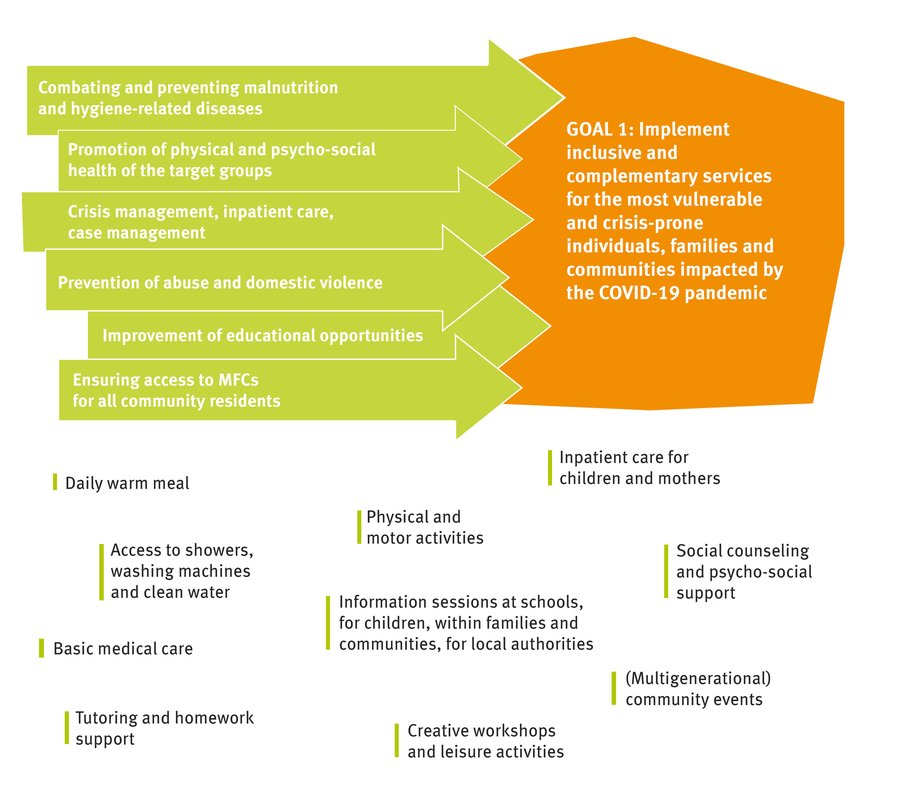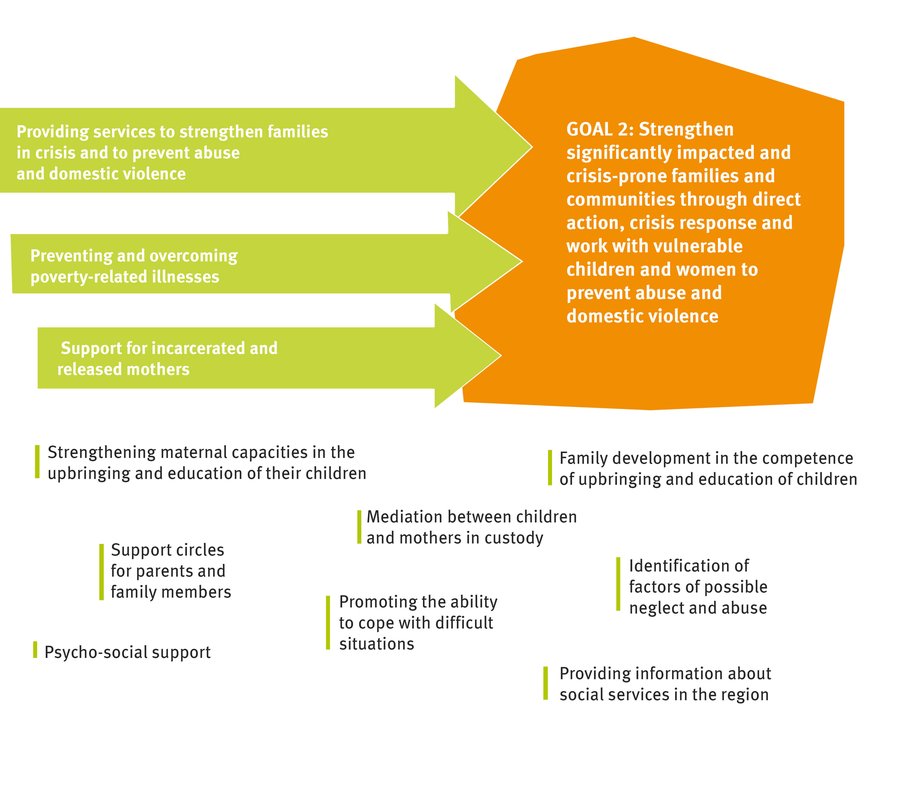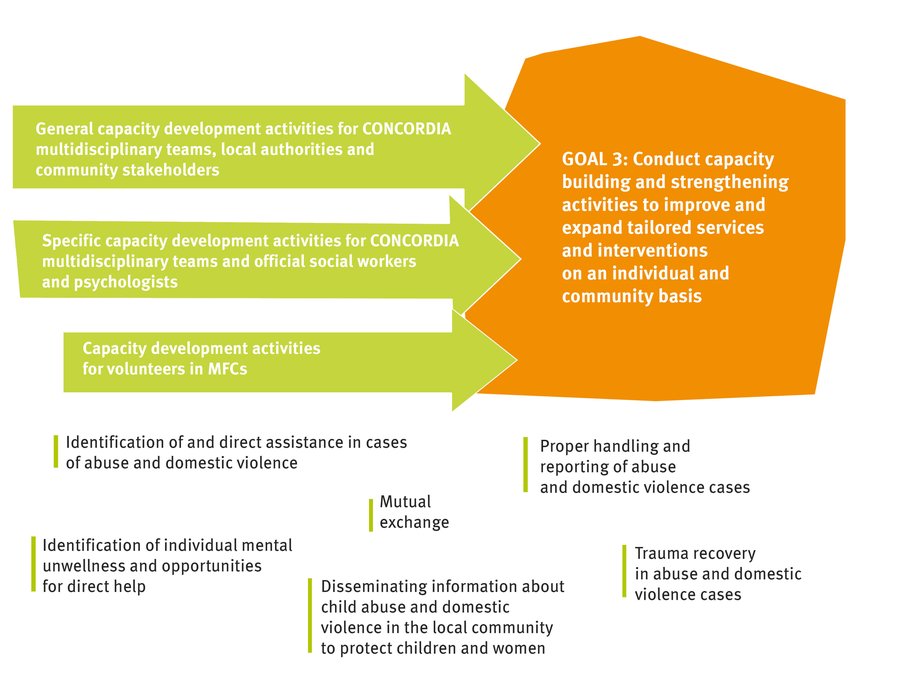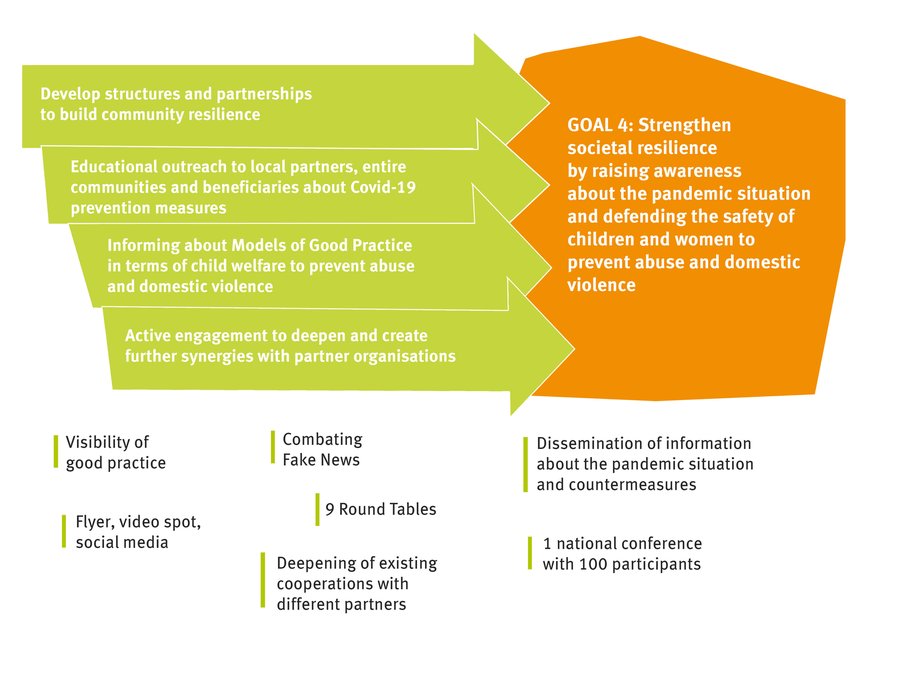Protection - Empowerment – Prevention (PEP)
Combatting the root causes of poverty-related diseases
Project duration: 1 July 2021 - 31 December 2022
Country: Republic of Moldova
Localities: Congaz, Cosăuți, Dubăsarii Vechi, Nisporeni, Pleșeni, Sănătăuca, Taraclia, Tîrnova, Tudora
Funded by: Federal Ministry for Social Affairs, Health, Care and Consumer Protection

SDGs: 2, 3, 4, 10
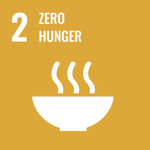
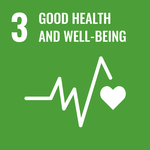
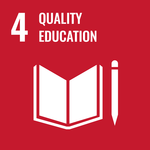
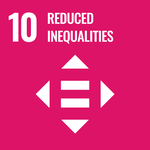
Pathway: Community based intervention
Contact persons: Eugeniu Rotari, Project Manager CONCORDIA Moldova (Chișinău), +373 22 234991, eugeniu.rotari(at)concordia.md; Nina Uransek, Project Manager CONCORDIA International (Vienna) +43 1 212 8149-23, nina.uransek(at)concordia.or.at
Short description
Protection - Empowerment - Prevention (PEP) is a project to sustainably combat the root causes of poverty-related diseases and infections in the Republic of Moldova. Due to the current pandemic, a special focus is put on the SARS-CoV-2 virus. Funded by the Austrian Federal Ministry of Social Affairs, Health, Care and Consumer Protection (BMSGPK), necessary measures will be implemented in structurally weak rural regions over a period of 18 months. In addition to comprehensive basic care (hot meals, access to sanitary facilities and hygiene products) the promotion of mental-social health and crisis management as well as the treatment of cases of abuse and domestic violence and tailor-made capacity development measures (for CONCORDIA staff, local authorities, volunteers) are set to lead to an even more effective care for the defined target groups (children, women, families, elderly). Through roundtables, a conference and other PR and advocacy interventions, relevant local stakeholders will not only be informed about Covid-19 prevention measures. It also builds community resilience. There is also a focus on raising public awareness about (causes of) abuse and domestic violence and prevention thereof.
With the planned activities the project strives to achieve the following Sustainable Development Goals (SDGs):

(2) Zero Hunger: End hunger, achieve food security and improved nutrition and promote sustainable agriculture

(3) Good Health and Well-being: Ensure healthy lives and promote well-being for all at all ages

(4) Quality Education: Ensure inclusive and equitable quality education and promote lifelong learning opportunities for all
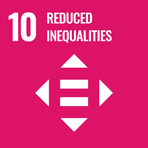
(10) Reduced inequalities: Reduce inequality within and among countries
Initial situation
The Republic of Moldova is not only the country with the highest labor migration, but also still one of the poorest countries in Europe. Overall, about one third of the rural population (31.6%) lives below the poverty line and even more among households with three or more children (42%).[1] Massive brain drain combined with a lack of jobs and training positions in the country and low levels of state support for families mean economic hardship and poverty - especially for children, who are often abandoned by their parents. In rural areas, the absolute poverty rate is five times higher than in urban areas. Households with elderly and/or single women, adults with disabilities or many children are particularly affected.[2]
The most vulnerable members of Moldovan society were hit hardest by the Covid-19 pandemic. Due to a lack of resources many families and communities were unable to cope with the crisis, structural and social inequalities were exacerbated. The government's aid program has been declared inadequate by the United Nations, primarily because it does not reach the most vulnerable in society.[3] In particular the lack of access to necessary basic supplies like food, medicine and medical services was emphasized.
Structural and infrastructural problems that already existed before the pandemic were made visible and increased by the crisis. As a result of the closure of public facilities and lack of infrastructure, in many places the possibilities of personal hygiene and use of sanitary facilities are not guaranteed. According to the UN, 79% of the rural population does not have adequate access to sanitation services and safe drinking water.[4] Temporary school closures, on the one hand, suspended school feeding programs. As a result, many children did not receive a regular hot meal and increasingly suffered from the consequences of malnutrition.
According to the UN, women and children lack access to basic services, money, emergency shelters and access to health care as well as psychological and legal support.[5] As long as state-run social systems are not yet developed to the point where sufficient social security can be guaranteed to the most vulnerable population groups, material support in combination with family-oriented counseling and support services are indispensable to prevent further poverty spirals, psychological destabilization and neglect.
As of 8 September 2021, 271,535 people have been reported as having suffered from Covid-19, representing just under 10% of the total population. 6,455 of these people have died. However, official statistics recording new cases and deaths are incomplete. The reporting system as well as the infrastructure for isolating and treating Covid-19 cases, are inadequate, so the number of unreported cases is assumed to be much higher. Particularly at the beginning of the crisis, the government had great difficulty implementing necessary safety measures nationwide, ensuring a universal supply of hygiene and protection products and thus creating safe conditions for children, women and the elderly. Currently, only 26.87 % of the population is considered fully immunized.[6]
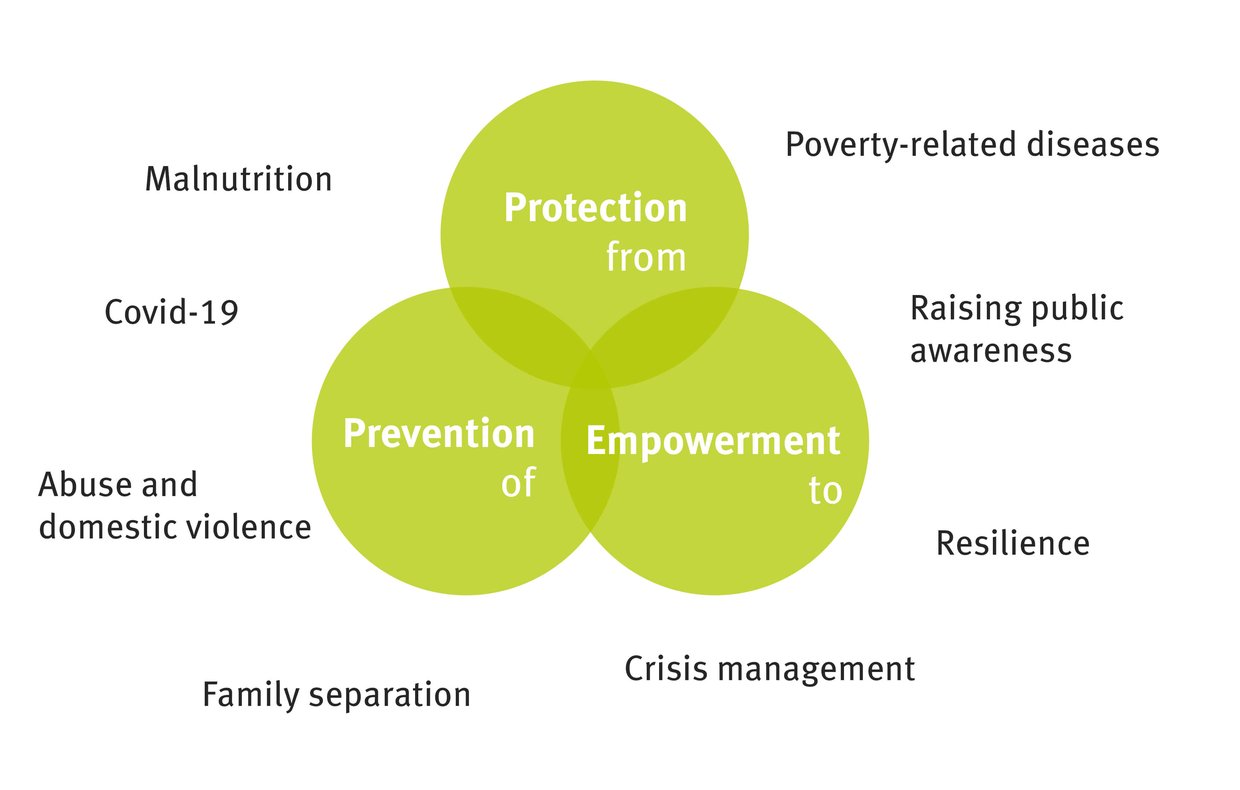
Implementation
The successful implementation of the project by CONCORDIA Moldova is based on the programs of CONCORDIA‘s Multifunctional Centers (MFC), CONCORDIA’s multidisciplinary Mobile Team and CONCORDIA‘s Academia.
| Northern region | Central region | Southern region |
|
|
|
Table 1: Overview of the regional location of CONCORDIA's Multifunctional Centers
CONCORDIA's Multifunctional Centers are strategically located in the structurally weak regions of the country and ensure access to hot meals, basic health care as well as learning and recreational activities for all people living in the immediate community as part of day care activities. Since the beginning of 2021 three MFCs have been transformed into crisis centers for mothers and children, providing emergency inpatient care in cases of abuse and domestic violence (MFCs Cosăuți & Nisporeni) as well as housing children at high risk of abuse (MFC Tîrnova).
CONCORDIA's multidisciplinary Mobile Team reaches out to families and communities in rural areas, who are not covered by activities provided in the MFCs and provides family and community strengthening interventions to prevent neglect, abuse and domestic violence.
CONCORDIA Academia is a specially created organization for capacity development of social service professionals.
The project addresses the root problems of poverty-related diseases and infections in the Republic of Moldova. CONCORDIA Moldova's multidisciplinary and collaborative approach is innovative. On the one hand, individually and collectively delivered services are implemented together with local government specialists to ensure a long-term and holistic support. On the other hand, raions and local authorities are involved in the development and implementation of CONCORDIA's social services. The planned capacity development of CONCORDIA's staff as well as the experts of the local authorities will lead to a sustainable strengthening of the social service structures in the Republic of Moldova. Family and community strengthening interventions as well as awareness-raising measures will also strengthen social resilience beyond the project period and preventively counter abuse and violence.
Target groups
Children: The planned project activities are set out to primarily target children. They come from families at risk of crisis and need access to basic care to ensure their health and well-being. In emergency situations children need to be separated from their family environment and treated as inpatients at the crisis centers.
Women: Women living under precarious economic circumstances and/or single mothers are reached and relieved directly but also through support services to their children. Through preventive measures against abuse and violence, their health and psycho-emotional condition is improved.
Adults: Adults are supported emotionally through counseling, awareness-raising and networking and thus become more resilient to crisis situations in the long term.
Families: Through counseling and support to overcome the crisis situation and support in raising their children, parents are supported and thus entire families relieved.
Elderly: Elderly, lonely people as well as those who are overburdened with the care of their grandchildren are reached and relieved by means of support for the children as well as direct counseling services.
CONCORDIA employees and volunteers: CONCORDIA employees and volunteers receive capacity building measures as part of the planned trainings. They will also regularly receive information on the Covid-19 pandemic and good practice recommendations.
Local Public Authorities and Raions: Social service professionals in local authorities and raions will receive capacity building activities. They will also regularly receive information on the Covid-19 pandemic and good practice recommendations.
The general public: The Moldovan public is reached mainly through specific awareness- and advocacy-related activities. The goal is to inform the population about the pandemic situation and vaccination options but also - as part of prevention activities – to make sure children and women are protected. At the community level residents are to be informed about the MFC's social services and sensitized to the issues of abuse and violence through information events.
Project progress and impact
As of 31 December 2021 the implemented project activities have reached an average of 475 beneficiaries per month.
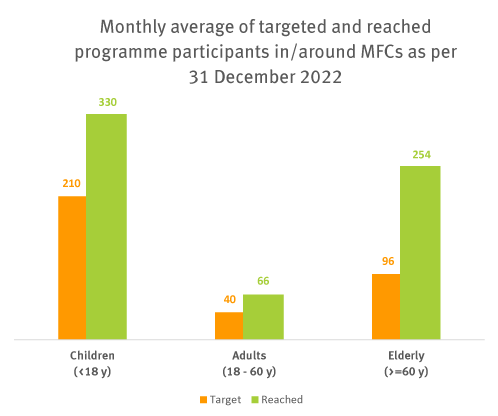
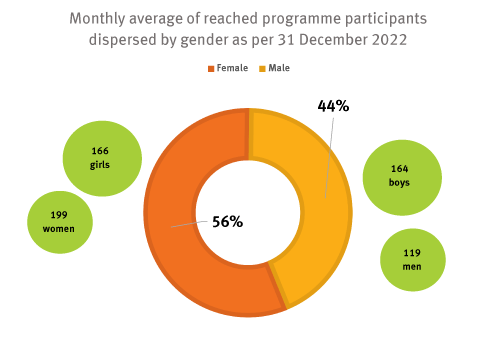
23 children and one mother have been placed in residential crisis care due to abuse and domestic violence as of 31 December 2021.
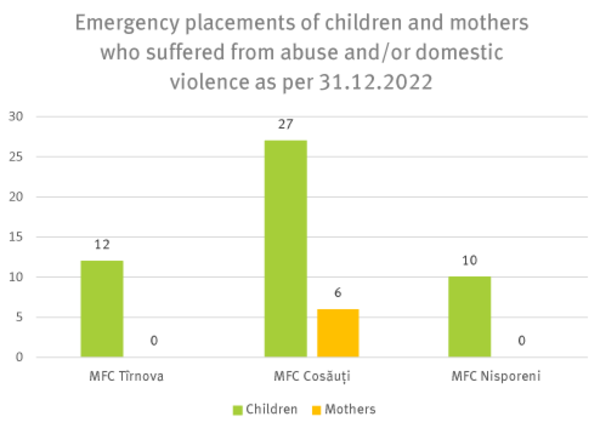
Since the start of the project in July 2021, four of the ten planned trainings have been carried out. These take place in parallel depending on the target group. Four more are going to take place in the first quarter of 2022.
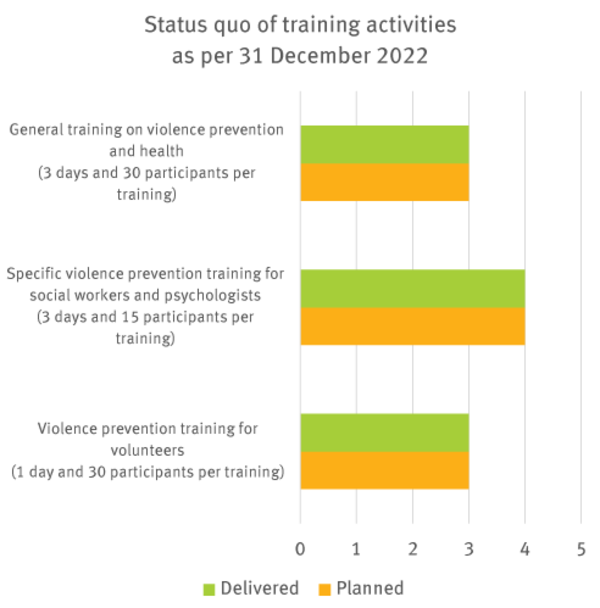
Considering that the majority of the project activities focus on awareness-raising, topic-specific information events are held on a regular basis. These range from lectures in the Multifunctional Centers to events in schools. In addition to the direct beneficiaries of the project, family members, teaching staff, social workers from local public authorities, political decision-makers (e.g. mayors) and other community members are thereby reached.
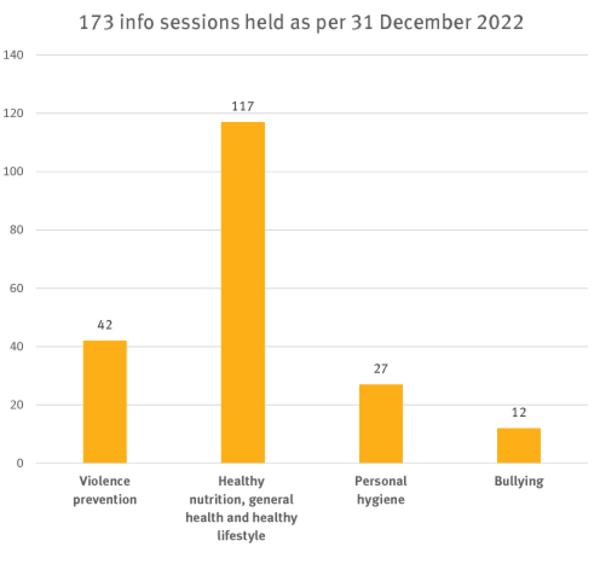
References:
[1] Weltbank: https://pubdocs.worldbank.org/en/185631608708604109/Moldova-Economic-Update-Special-Focus-Dec-22.pdf
[2] Interim Evaluation Report of the National Development Strategy ‘Moldova 2020’
[3] UN Moldau: https://reliefweb.int/report/moldova/covid-19-socio-economic-response-and-recovery-plan-updated-version-september-2020
[4] UN Moldau: https://reliefweb.int/report/moldova/covid-19-socio-economic-response-and-recovery-plan-updated-version-september-2020
[5] UN Women: https://moldova.unwomen.org/en/noutati-si-evenimente/noutati/2020/08/gbv-rapid-assessment


